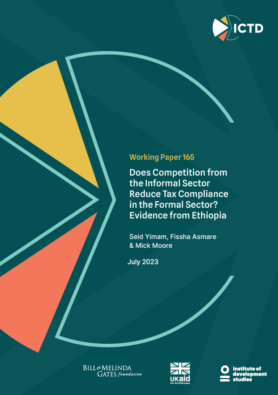Working Paper 165
It is widely believed that the existence of ‘informal sector’ enterprises that visibly do not pay direct taxes reduces the willingness of owners of formal, tax-registered enterprises to pay their own taxes. We call this the adverse evasion spillover hypothesis. It is for several reasons hard to test this hypothesis, especially in this most general form.
We test a more focused version, with two components. One is that the levels of tax compliance of formal firms are reduced when those firms perceive that they are adversely affected by direct economic competition from informal enterprises. The other is that these effects are especially marked for smaller formal sector firms. Two particular procedures enabled us to collect the data needed to test these hypotheses in a satisfactory way.
First, the Ethiopian Ministry of Revenue kindly gave us access to ten years of their administrative data relating to a representative sample of 408 tax-registered firms located in Addis Ababa. Because these records included information on whether firms had been penalised for attempts to understate their tax obligations, we were able to divide our sample into two groups of more and less compliant firms. We then surveyed the owners of those firms, adding in questions about their perceptions of the extent to which they felt adversely affected by competition from informal enterprises, but giving no hint that we were especially interested in tax compliance, or that we had access to their tax compliance record.
Our two hypotheses were validated. The more that formal, tax-registered firms perceived that they faced market competition from informal enterprises, the lower were their levels of tax compliance. This adverse impact of perceived competition on tax compliance was greater for smaller formal, tax-registered enterprises.
